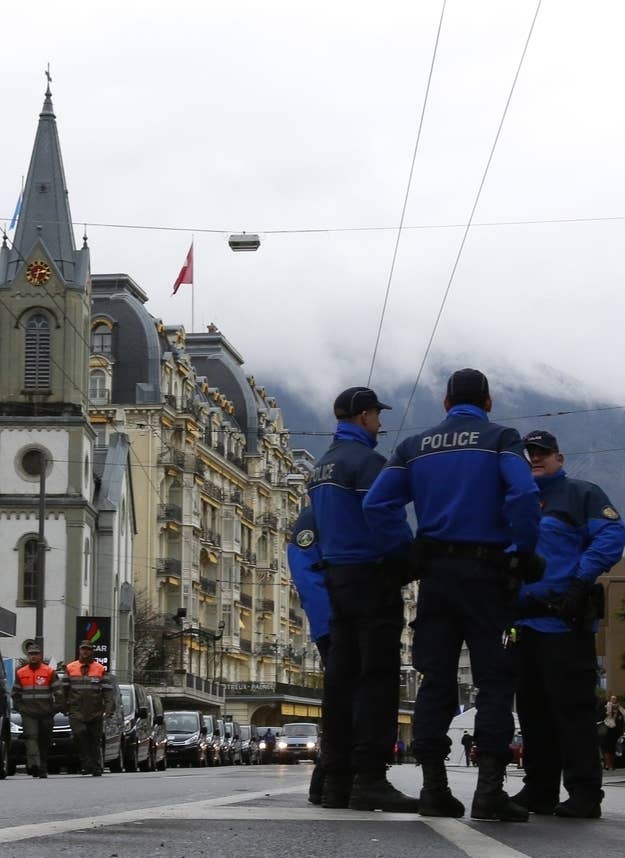
MONTREUX, Switzerland — Adnan Hadad had settled into his four-star hotel room in this lakeside resort town on Tuesday night when he realized he had unexpected company. An opposition activist and citizen journalist who normally reports on the carnage in Syria, Hadad had come to Montreux to report on the peace talks opening here today. He knew it would be his first chance to see regime officials up close — but he found it hard to believe that they might be staying in the same hotel.
Then a colleague confirmed it, rushing over with an iPad photo showing the Syrian delegation walking into the Grand Hôtel Suisse Majestic under heavy security. "We're in the regime hotel," Hadad mused. "We're fucked!"
Hadad is one of five Syrian activist-journalists on hand in Switzerland to cover the conference. He and other Syrians have brought the conflict to the world with news and video from places international journalists often can't reach. But they were accustomed to avoiding the regime at all costs — to keep from being arrested or killed — not submitting it media requests.
"These guys are maniacs," Hadad said later, standing somewhat warily in a hotel elevator. "Expect anything from them."
The presence of Hadad and his colleagues added to the surreal feel in quiet Montreux, blanketed suddenly by journalists, diplomats, and surprisingly aggressive hordes of Swiss police. Hadad's roommate at the Majestic is Rami Jarrah, a well-known media activist who'd once been tortured by Syrian state security. Now he'd spent the day tracking down press credentials and preparing to cover the conference alongside the regime's media entourage. He even put in email requests to interview some of the Syrian officials on hand — though he had no idea what he'd say if one agreed.
The setting for the talks, Jarrah said, was strange in itself. "It's so contradictory: the scene, the lake, the town and what they're talking about," he said, motioning to the view of Lake Geneva from the hotel room's windows.
As another citizen journalist — Maher, who asked to use only his first name because he reports from inside Syria — put it: "There is a big difference between where I am now and where I usually work."
Maher hoped to use the opportunity to report on "what's happening behind the curtains," he added.
Sprawled on the bed of the hotel room, Jarrah reviewed video from the day on his laptop — footage of the media center and the surrounding, picturesque streets. When it finished, the video player went automatically to the next file in his queue. It was the kind of report Jarrah was more accustomed to presenting: on-the-ground footage from the immediate aftermath of a regime air strike. In the video, someone draped a blanket over a charred corpse.
The Syrian journalists said they could provide a perspective that would otherwise be missing from the international press corps that had descended on Switzerland. They criticized the Western media in particular for often treating the opposition and regime as two equally culpable sides. They also stressed the importance of differentiating between the disparate opposition and rebel groups. "It's really easy to call everybody a terrorist," Hadad said. "It's much harder to understand who they are and where they come from and really, what made them OK with violence."
They made no claims of being unbiased, they added. Jarrah described his position as "neutral within the standards of common sense."
That Syrians like Hadad and Jarrah were sharing the small town with regime officials and their supporters underlined one of the few hopeful notes to emerge so far from the talks, which few observers expect to end the conflict. Just getting the two sides together for negotiations, one U.S. official told BuzzFeed, was notable in itself. "The story line that is not being followed is this is remarkable: They're sitting down with each other for the first time in this conflict," the official said.
On Tuesday night, Jarrah said he planned to try his luck in interviewing the pro-Assad supporters who'd come to Montreux. He had his chance when they massed outside the talks on Wednesday afternoon, chanting and holding photos of Syrian President Bashar al-Assad. Jarrah and Hadad pulled out their cameras and began to film. When they asked the crowd whether they could support the idea of Assad leaving power, they were attacked — Assad supporters punched and kicked them before they retreated, shaken but unhurt, back to the press center. "The guys outside are thugs," Jarrah said.
